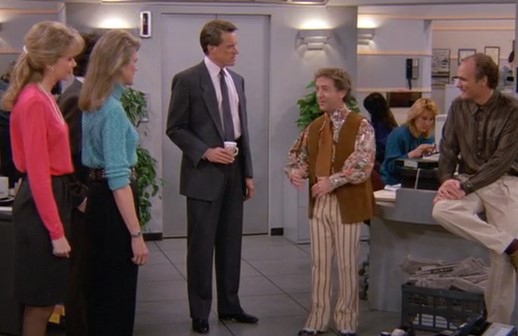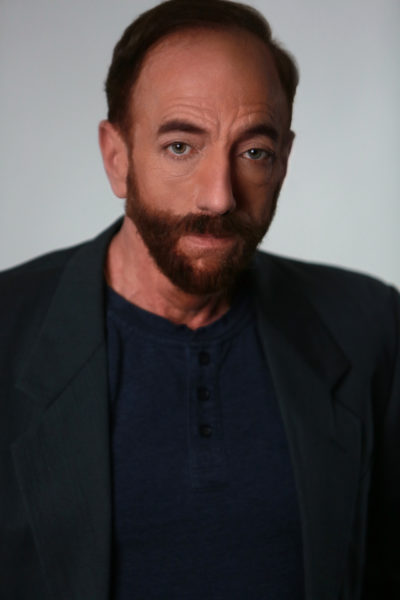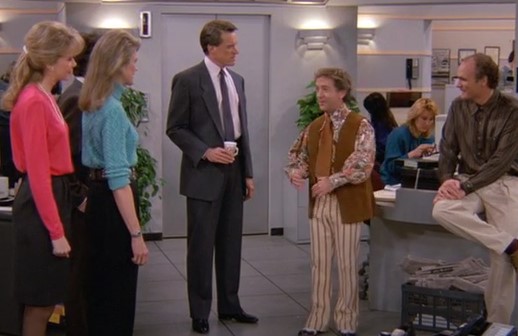HOLLYWOOD – In 2020 drag queen Trixie Mattel mock killed off Leslie Jordan. “Do you remember Leslie Jordan?” she quipped. “Rest in Peace.” Both her co-host, Katya, and the cameraman were horrified. With sincere shock the cameraman can be heard exclaiming, “What? No!”
“No, no, I am kidding!” Trixie howled in laughter at her fake out, and the deeply pained reaction it generated.
Today, the joke is over, and the laughter has stopped. Leslie Jordan is gone.
Many will call Leslie Jordan a “gay icon”, but he is much more than that. He has been the constant television presence that gave us permission to be our authentic queer selves by whole heartedly embracing his own gayness.
He is the icon that the icons mourn. Dolly Parton, certainly in that category, said. “Well I am as hurt and shocked as if I have lost a family member. Leslie and I had a special bond, I think the world felt they had a special bond with him. I know people always say, “Oh they will be missed” but in this case, that could not be more true. He will be missed by everyone who knew him personally and by everyone who was entertained by him. Rest in peace lil brother.”
Leslie Jordan was part of our collective gay brand. While media liked, and still likes, to portray gay men with certain affectations that became cringe-worthy cliches, Leslie Jordan blew past them. His character was those presentations in their true authentic form. As Mayim Bialik told him in her podcast interview, “Your brand is YOU being you.”
As Leslie told Ellen on her show, “I open my mouth and fifty yards of chiffon comes out.”
Recently, for many in America, Leslie was the epitome of finding humor in our shelter-in-place reality. At the start of the pandemic, he had 80,000 followers on Instagram. By the end of the quarantine, thanks to his twice daily postings for 80 days, he had 5,500,000 followers. That was only the beginning—his whimsical short videos became TikTok snippets and You Tube pleasures as well.
In the broader history of television, Leslie’s appearances will stand out as a branding on any television show that wanted to make its stamp as an LGBTQ landmark. From Murphy Brown to Ryan Murphy, from Ellen’s coming out sitcom to Will and Grace, from Desperate Housewives to RuPaul’s Drag race… at one point or another, they all featured a Leslie Jordan episode. When they did, they could be assured of one thing: Leslie would steal the scene, every time.

“From the first time I saw him on an episode of Murphy Brown in 1989, he was hysterically hilarious. So grateful for the 33+ years of laughter from this deeply gifted man,” states Mark Hamill. The magic that was Leslie Jordan in 1989 can still be felt in today’s queer culture.
“A light, a joy, PURE LOVE. What a loss. Love you sweet Leslie,” mourns Drag Race’s Michelle Visage.
“What a loss, an unapologetic masterclass on how to live life!” famed drag queen Vivienne states.
“Devastated to find out that Leslie Jordan has passed. He was such a queer icon to me,” Trinity the Tuck responded to the news.
“What an angel. Gone much too soon,” gay Rom-Com trailblazer Billy Eichner states.
“Leslie, we are heartbroken at your loss and will miss your mirth and your inimitable spirit.” George Takei wrote in tribute.
Leslie was gay and adored from the beginning. He was born in Chatanooga Tennessee in 1955, and a few years later became big brother to twin sisters. “I fell out of the womb and landed in my mother’s high heels,” he said.
His family was religious with his mother getting them into church at any point where “the doors were open.” His dad was a military officer who was adored by his son, even when in Tennessee society in the 50s, it might have found little Leslie a bit much with which to deal. As his dad sat on the front porch with butch miliary friends, little Leslie’s voice could be heard from the front yard, “Daddy, daddy! Watch me… twwwwiiirrrrl!”
When Leslie was three, he wanted a bride doll for Christmas. His military Lt. Col. dad told his wife “no.” On Christmas eve, as Leslie was going on and on about how Santa would bring him his bride doll, Leslie’s mom asked her husband, “What are your going to tell him?” The next thing she heard was the back door shut.
The next morning, Leslie found a beautiful bride doll under the tree. Leslie’s dad died in a plane crash nine years later.
Leslie found ways to be himself. “In high school, you have to play the game. Nobody bothered me—nobody teased me –because I was funny. I learned to be funny to keep the bullies at bay. So nobody would tease me. But I was always waiting for that axe to fall.”
Leslie arrived in West Hollywood in 1982. As he described it, West Hollywood was a “city in crisis”. It was a time that forged his gay bravery into his persona, and gave him the spirit that would later burst through his comedic genius. “People were dropping like flies from AIDS. We were not getting any help, so we figured out very quickly we had to take care of our own. I jumped into the trenches, and I… I saw miracles. With people whose families had turned their backs on them because they found out not only that they were gay, but they had this disease, It was a real period of growth for me where some real beauty came out of that. We were all going through this together. In the gay community, we were going though that struggle all together and we came out a stronger community, a more loving community. Because we were more willing to reach out to one another. That was when I figured out that I couldn’t argue with people (about being gay), I’m not going to argue with them. I know what I know. I know what I know.”
In the past few decades, Leslie weaved his brand of out-hilarity with his own internal demons. “The dark cloud that followed me was not my homosexuality, it was depression,” he said. He found recovery and his own sense of spirituality. He related to something his friend Carrie Fisher had said: “I am a very enthusiastic agnostic who would love nothing better than to be proven wrong.”
He told Mayim Bialik, “I seek with an open heart, I would love nothing better than to believe in a Higher Power and I talk to him. Do I know for sure? I don’t think any of us know for sure. In the seeking you find your faith.” He rankled at the idea that being gay was his “cross to bear.” “No, it’s not my cross to bear! It is who I am! I am just a little open book.”
In the end, there is comfort in knowing that Leslie Jordan not only lived as his most authentic self, but he also lived his best life. He is quoted as saying recently, “I am as content as I could possibly be. What a blessing to be content with yourself.” For those of us who emulate him, that might be our great take-away. The very gay Leslie Jordan has left us with the permission to be content with ourselves, just the way we are.
That should also bring his late mother solace. She proudly accepted him when he came out to her at age 12. Her only comment was “I am concerned that you will be subject to ridicule. So. I think you should live your life quietly.”
Well. We all know exactly how well THAT didn’t work out.
Thank God.
*************************

Rob Watson is the host of the popular Hollywood-based radio/podcast show RATED LGBT RADIO.
He is an established LGBTQ columnist and blogger having written for many top online publications including Parents Magazine, the Huffington Post, LGBTQ Nation, Gay Star News, the New Civil Rights Movement, and more.
He served as Executive Editor for The Good Man Project, has appeared on MSNBC and been quoted in Business Week and Forbes Magazine.
He is CEO of Watson Writes, a marketing communications agency, and can be reached at [email protected] .








